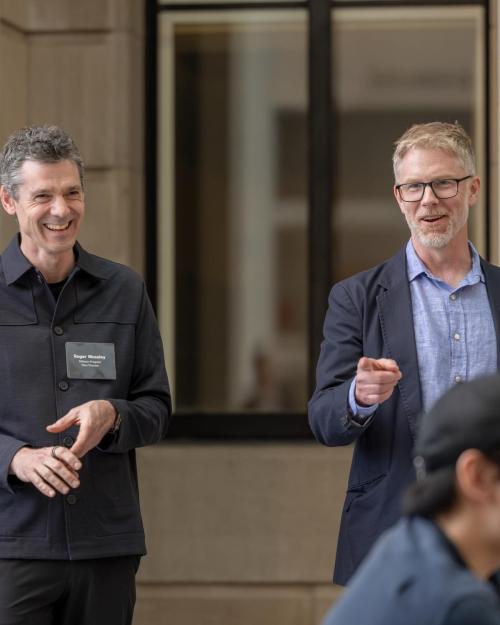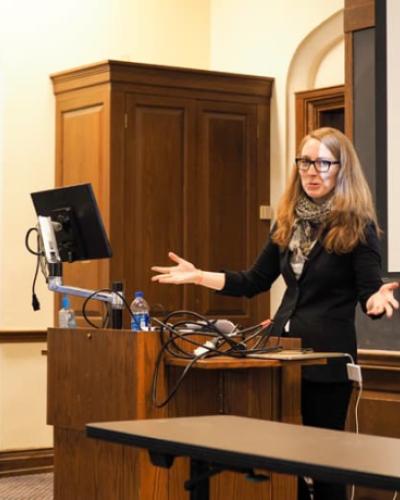In October, as part of the Milstein Program speaker series, we were given the opportunity to attend private lunchtime discussions with two women writing on topics at the intersection of technology and humanities: Moira Weigel, a fellow at Harvard University, and Natasha Singer, a journalist with The New York Times.
Weigel, who received her PhD from Yale University in comparative literature and film and media, is a writer and founding editor at Logic magazine, a print and digital magazine about technology. Her work examines how emerging media technologies shape culture — and vice versa — in a comparative context. She also has a deep interest in the history of feminism. In her talk "How Not To Be Evil: Tech-workers Against Racism, Sexism and Surveillance," Weigel revealed the struggles women face in this field.

Weigel said that despite the growing number of women in technology fields, issues such as sexual harassment are still prevalent, evidenced by some recent cases involving tech workers, including one at Uber and other companies. In addition, she talked about how technologists working for global companies with large government contracts are fighting to influence the decision-making process, and the implementation of policies and partnerships at their companies regarding ethical concerns. For example, recently, Google launched an initiative called “Project Maven” in which the company gathers data from its artificial intelligence systems, specifically through drones, and reports this information to the US Department of Defense (DOD). Google employees did not want to proceed on the project, knowing that their creation could be used by the DOD to target and kill individuals in warfare.
Similarly, Weigel discussed how Amazon and Microsoft recently launched like projects that violated established AI principles and the employees advocated to pull out of these deals, however, oftentimes, these requests were ignored. For example, Amazon’s “Rekognition” program allows the company to store facial recognition data of millions of people and reports that data to the police, while Microsoft’s “JEDI” contract with Immigration and Customs Enforcement creates code used by the Department of Defense. Weigel encouraged the Milstein students to consider the moral implications of these complex cases.
Our discussion with Singer, a technology reporter for The New York Times focused on her research and writing about the effects of technology on the American education system, and the dominance of Google and Apple in public school classrooms around the country. She explained how through clever marketing practices, the companies have effectively established their monopolies in various regions of the country. Singer also discussed the ethical issues of “exploiting” public school teachers and students through free beta testing of their products.

Singer also talked about how Google, originally targeting its products toward adults, had to make changes to its privacy and ad policies, given the stringent policies against advertising to under-aged individuals in public schools, yet was reluctant to do so at first. The company still saw great success because the executives offered Google services, such as Gmail and Google Drive, for free (in exchange for user testing and feedback) to public school systems. Singer explained that it wasn’t the low cost of resources that convinced the teachers to use Google products in the classroom, but rather the idea that their students might be at a disadvantage if they did not learn the “skills of tomorrow,” such as analyzing data and using spreadsheets. In fear of falling behind in a technologically advancing world, teachers implemented the program to help their students get ahead of the technology literacy curve. This, in turn, raises some complicated questions. Does using Google actually improve education? Are public school systems being exploited by giving millions of dollars of free testing to one of the richest companies in the world? We went on to discuss two different models of education: the “Jefferson model,” which claims that students should learn how to be citizens in a democratic society, as well as the “Industrial model” which claims that students should learn skills to be productive members of society.
We discussed how Google principles for education emphasize collaboration and communication; the creators of Google drive believe students should not be taught to memorize when they can search for information on Google, but instead should learn how to apply their knowledge to solve real-world problems. We also looked at other examples of exploitation and privacy infringement in technology such as the app VoteWithMe, which reveals information about voter demographics.
Both of these talks prompted us to think about issues that occur with emerging technologies in a new way and to consider current events and issues. Each woman offered a different perspective on prevalent issues such as the role of women in technology, privacy infringements and exploitation and the group engaged in meaningful discussion and debate and took away some deeper insights into current events.






